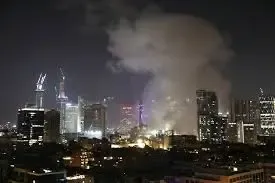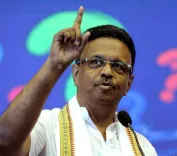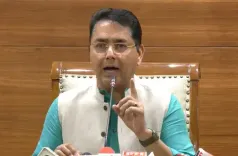What is Driving the Crisis in the Middle East?

Synopsis
Key Takeaways
- Escalating tensions: The conflict between Israel and Iran is intensifying, with implications for regional and global stability.
- Humanitarian crisis: The situation in Gaza remains dire, prompting international concern and calls for aid.
- Global involvement: Major powers like the US, China, and Russia are influencing the dynamics of the conflict.
- Arab states' stance: Gulf nations are reconsidering their relationships in light of Iranian aggression.
- Future of the region: The outcome of the crisis could reshape alliances and influence the geopolitical landscape for years to come.
New Delhi, June 18 (NationPress) The historically volatile Middle East has been engulfed in a triangular conflict involving Israel, Iran, and the Gulf Arab states, primarily Saudi Arabia and the UAE. This geopolitical rivalry sees major powers like the US, China, and Russia backing different sides based on the evolving geopolitical landscape.
The Gulf nations have long been allies of the US, while Iran has increasingly aligned itself with China and Russia. Israel continues to enjoy unwavering support from the US, with the Trump Administration attempting to foster relations between Israel and the UAE through the Abraham Accords, potentially paving the way for Saudi Arabia to follow suit. Currently, the tension between Israel and Iran is at a boiling point, with full backing from the Trump administration for Israel and covert support from the China-Russia alliance for Iran, posing a risk of a global conflict.
In response to the Hamas attack on Israel on October 7, 2023, Israel initiated a military campaign in Gaza, resulting in over 40,000 Palestinian casualties. The ensuing humanitarian crisis has captured global attention, forcing Israel to implement aid distribution plans for civilians. Confident in Trump's steadfast support, Israel has rejected calls for a ceasefire. Iran has further empowered Hamas, strengthening its position against Israel. Trump has committed to navigating the Middle East crisis, marking his first foreign visit of his second term to the region in May.
After a surprise meeting with the new Syrian President Ahmad Al Sharra, Trump lifted economic sanctions on Syria, leading to widespread celebrations. He also initiated a ceasefire agreement with the Houthis of Yemen and sought direct talks with Iran, steps welcomed by Arab nations but opposed by Israel. The Gulf states, witnessing Iran's ascent as a regional power, particularly with Hamas as a proxy, are considering normalizing ties with Israel. Nevertheless, the escalation between Israel and Iran raises their concerns about Israel becoming a regional hegemon.
Israel perceives the proposed new nuclear deal with Iran as a 'lifeline' for the Islamic Republic, advocating for military action to dismantle Iran's nuclear capabilities. The Gulf nations prefer a diplomatic solution that incorporates Tehran into regional security frameworks, fearing a situation where Israel operates without constraints. The Arab states are supportive of Trump's efforts for a new nuclear agreement with Iran, suggesting an underlying Islam-Zionism dynamic influencing Middle Eastern developments beyond the Sunni-Shia divide.
The increasing military tensions between Israel and Iran coincide with Trump's exaggerated claims that Iran is being offered a chance to accept a deal with the US. Israel believes the US would understand if it launches missile strikes on Iran to compel compliance with the proposed nuclear agreement. On June 13, Israel conducted extensive airstrikes on Tehran, resulting in 220 fatalities, including women and children, and damaging nuclear facilities at Natanz. Key Iranian military figures were also killed in these strikes.
Prime Minister Netanyahu asserted that Israel's air force dominates the skies over Tehran, aiming to eliminate both Iran's nuclear threat and missile capabilities. In response to the strikes, Trump emphasized that Iran had a final opportunity to accept the nuclear deal or face total devastation. The US government distanced itself from the airstrikes but acknowledged that Israel utilized its American-provided military assets for the operation. Iran's Foreign Minister warned that the US would bear responsibility for any Israeli aggression.
In retaliation, Iran unleashed a barrage of drone and missile attacks on Tel Aviv and Haifa, deploying nearly 350 missiles, leading to at least 34 Israeli casualties. Trump cut short his G7 visit in Canada due to the escalating situation in the Middle East, urging Iran to engage in dialogue with Israel to alleviate tensions. Meanwhile, Netanyahu exacerbated the conflict by suggesting the assassination of Khamenei would resolve the crisis. Following the suspension of nuclear deal negotiations with the US, Iran's Foreign Minister appealed to Trump to persuade Israel to agree to a ceasefire to halt the aerial conflict. The Gulf Arab states are eager to prevent a regional catastrophe and advocate for a halt to hostilities.
Trump appears to believe that Iran will concede first. Given that this 'war' is fueled by religious extremism on one side and a survival instinct in the Zionist state on the other, the outcome is unpredictable and could catch the world off guard. From India's perspective, it is concerning that Pakistan has sided with Iran, citing its status as an Islamic Republic deserving of support from fellow Muslim nations. This adds a religious dimension to the Iran-Israel conflict and connects with the Sino-Pak strategic partnership, as Iran enjoys backing from China and Russia in its conflict with Israel. India has interests in the Middle East and should advocate for an immediate de-escalation of the Iran-Israel military standoff.
(The writer is a former Director of the Intelligence Bureau)





